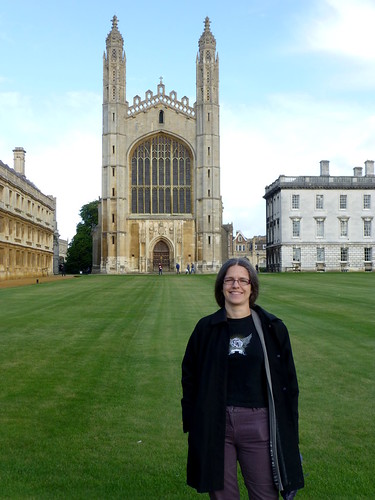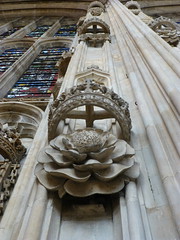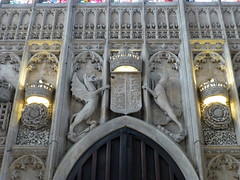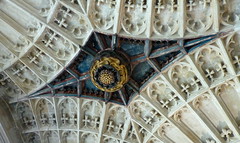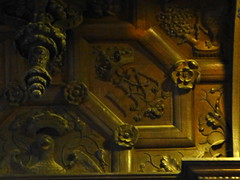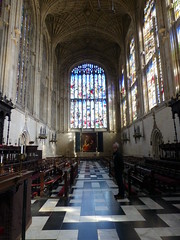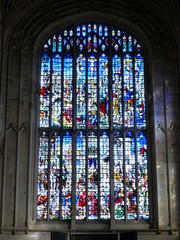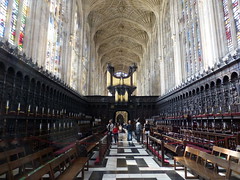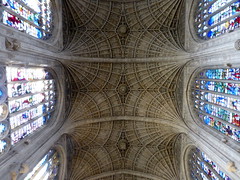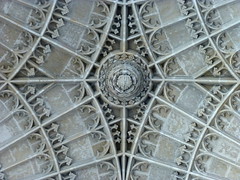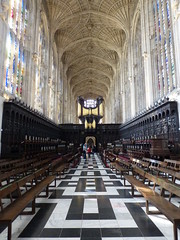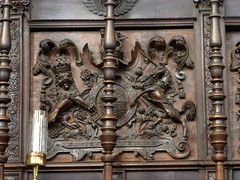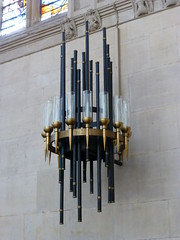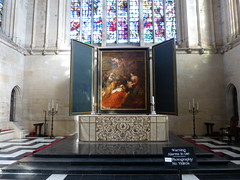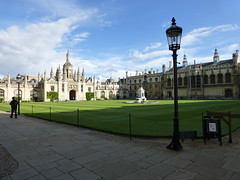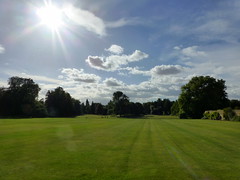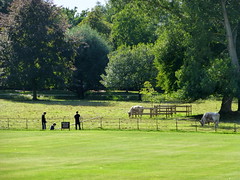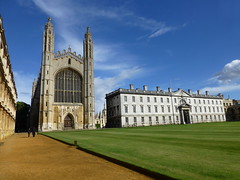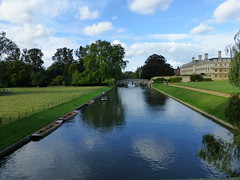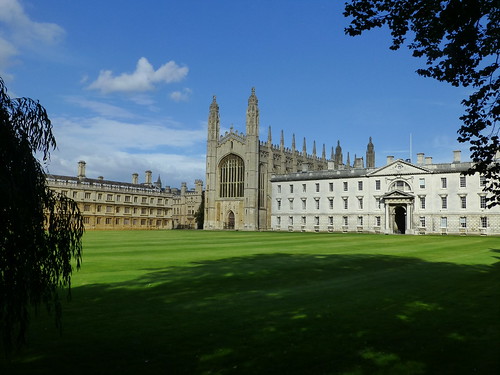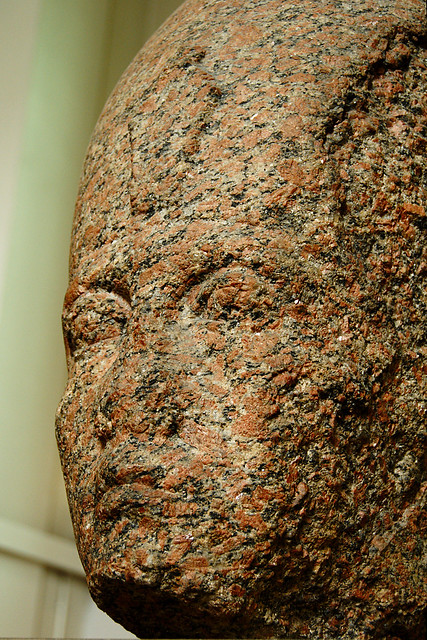The Wonder of Dogs
More about dogs – this episode concentrated on their senses & intelligence. This included demonstrations of how good their hearing, smell & eyesight is (in particular that a dog’s field of view is much wider than a human’s). They also talked about the sorts of behaviours that dogs have been bred for – using gun dogs as the primary example. The desired behaviour has changed over time, as gun tech & hunting styles changed. So at first it was pointers (who found and pointed to the game) then spaniels (to bounce around and flush the game out) and finally retrievers like labradors (to bring the game back to the hunter). And they demonstrated how training is needed as well as the innate behaviour using one of Kate Humble’s dogs – who is a herding breed, but who wasn’t a very useful sheepdog after only one lesson (although very enthusiastic).
They also had a bit on how intelligent dogs are, including a German group who are studying dog intelligence by getting them to push pictures to get treats. They’re offered a choice of a dog picture & a landscape picture each time, and they learn that dog pictures get treats. Which is quite an abstract level of thought – it’s not one dog v. one landscape, it’s a variety of pictures of a variety of scenes & dogs. I wanted to know if dogs could tell the difference between, say, cats & dogs for getting treats.
Shakespeare in Italy
This is a two part series about Shakespeare’s connections with Italy that we’ve had on the PVR for ages. It’s languished there in part because I find the presenter, Francesco da Mosto, irritating (irrational on my part, I’m sure, his style just sets my teeth on edge). But despite that it was still interesting enough to watch the second part.
This episode was about Shakespeare using Italian places (and stories) to tell stories about love. The plays he talked about were Taming of the Shrew (marriage for money not love), Romeo & Juliet (obviously, tragic love), Much Ado About Nothing (rom com) and Othello (love turned to jealousy). Along the way he visited various places mentioned in the plays, and talked about the Italian stories they were based on. He also discussed how Shakespeare might’ve visited Italy – there’s no record of him doing so but there’s also 7 years where he’s missing from any records. So perhaps. Of note, tho, is that the British Museum Shakespeare exhibition that we went to last year (post) was sure that Shakespeare didn’t visit Italy but instead talked to people who had. And there was also a somewhat nutty theory put forward by a town in Sicily that Shakespeare was actually Sicilian – some playwright or poet whose name translates to Shake Spear who goes to London. I’m not sure if or how they tried to reconcile this with the Shakespeare who exists in records prior to this Italian’s arrival …
The second part was looking at how Shakespeare set plays in Italy to give himself a layer of plausible deniability when writing about politically sensitive subjects. So he talked about The Merchant of Venice as being (among other things) about law & the rule of law. And Julius Caesar, set not just in Rome but in long ago Rome, is a commentary on tyrants and if it’s ever justified to assassinate them – a particularly touchy subject at the time, as there were many assassination attempts on Queen Elizabeth and the England of the time was very repressive. Italy was also the country of the future – da Mosto made much of how the Renaissance was in full swing in Italy but England was lagging behind. Anthony & Cleopatra was an example of a play where Shakespeare was exploring new ideas to come out of Italy – in this case how a ruler should act and da Mosto said it owed much to Machiavelli. The final play he talked about was The Tempest – based in part on a well known alchemist or sorcerer in Naples at around that time. Again a touchy subject – James I was paranoid about witchcraft – but it was also the way of the future (in that alchemy leads to science in a while).
I’m a bit conflicted about this series – it was an interesting subject, but I still found the presenter irritating.
David Attenborough’s Rise of the Animals: Triumph of the Vertebrates
This is a new two part David Attenborough series, all about the evolution of vertebrates. The first part, From the Seas to the Skies, covered the first vertebrates and the major developments leading to the evolution of fish, amphibians, reptiles (including dinosaurs) & birds. It was a rather good mix of fossils, modern animals and cgi reconstructions of ancient animals. I was particularly fond of the tiktaalik taking it’s first waddly steps across the land. The gliding feathered dinosaurs were also neat. I don’t think I learnt anything new in terms of concepts or the overall story, but there were several new details – like the tiktaalik as the first animal to get onto land (I’m sure I learnt about lungfish escaping predators in the past), or the Chinese fossil beds that pre-date the Burgess Shale ones that I knew about (and contain the first known chordate, ancestor of modern vertebrates).
If I’ve got one quibble is that the language used emphasises progress too much. I’m probably over-sensitive to this, tho. But I do think it’s important that there’s no inevitability about the evolution of any species or group, and that there’s no progress – modern lampreys aren’t “primitive” for instance, they’re well suited to the places they live. Lacking most of the features we think of as common to the vertebrates (like jaws, fins or limbs) doesn’t make them worse it just makes them different. But it’s very hard to avoid because when talking about these things it’s easiest and clearest to tell a story, which leads to language that implies progression and purpose. So in this programme Attenborough talks about problems needing to be solved before vertebrates could move onto the land. Which makes me wince because there wasn’t any working towards a goal involved.
Ancient Greece: The Greatest Show on Earth
This is a recent series from Michael Scott, about the development of drama & theatre in Ancient Greece. The first episode looked at how the development of drama as an artform is intertwined with the development of democracy. Both have their roots in Athens, in the 5th & 6th Centuries BC and at the smaller local level debates & plays would even happen in the same assembly spaces. Greeks had three sorts of plays, two of which we still have. These were tragedy, comedy & satyr plays – the last were bawdy, farcical plays which were used as a sort of palate cleanser after a cycle of tragedies. Tragedies in a modern sense are stories with a sad ending, but Scott said Greek ones were more about posing questions about situations. One of the experts he spoke to characterised tragedies as setting up problems caused by bad luck or bad decisions, and suggesting how they might be dealt with while getting the audience to think about what would they do in this or similar situations. Plays were often based on myths, but the stories told were topical and relevant to recent politics domestically & abroad. And the audience for the plays would be the same men who would then vote on how Athens was run & how it reacted to events. Scott was saying that this close link between the subjects of plays and the real life decisions that were being made meant that plays can be seen as educating the Athenians about democracy and as a part of how democracy evolved. Comedies were also important in this process – they weren’t just funny stories, they were generally pointedly aimed at particular political figures. Who would be right there watching thinly veiled versions of themselves be publicly mocked. Scott said this was part of how the boundaries on what was & wasn’t appropriate behaviour were enforced.
The Story of the Jews
The last episode of Simon Schama’s series about Jewish history looked at the formation & history of the modern state of Israel. He started with the Holocaust and the plight of the Jewish refugees during & after that horror. He talked about how even those fighting against Germany in the war were not willing to do much for the Jews – lots of sympathetic noises not much if any actual support. And how this led to more Zionism in the Jewish population – if no-one else will aid you or want you, then you are even more in need of a homeland of your own. And then Schama moved back to trace the steps towards the formation of the modern Israel – starting with the Zionist movement in the early 20th Century getting the British Empire on board with granting the Jews a homeland within Palestine. Apparently in the early days post WWI there were even some glimmers of hope that a future Israel and the existing Arab nations might co-exist in some form of peace. Sadly, as we now know, this was not to be – the influx of Jews post-WWII being a contributing factor, with the British Empire’s poor handling of the situation pre & post war also being important. (Promising the same real estate to two groups of people as “their own nation” isn’t ever going to end well …). Schama then discussed the history of Israel since independence, and how over time (and after two wars, more persecution of Jews in Arab nations & violence and terrorist attacks on Israelis in Israel) the politics & sentiment inside Israel has calcified into hatred & mistrust of Arabs. Schama talked to someone involved in the Settler movement, who was disturbing in his starry-eyed rhetoric about how the Jews were entitled to the land up to the biblical borders by God given right. And Schama visited the wall built to keep the Palestinians out of Israel, or at least only allow them through under strict observation.
I found this series thought provoking & well worth watching, although frequently grimly depressing. As well as the subject matter itself it was an interesting reminder that so much of the stuff we watch is from our own perspective – this very much wasn’t, it was Simon Schama’s take on Jewish history from the perspective of a member of the culture whose history it was.
